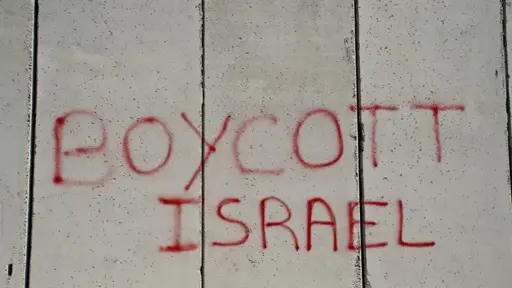The Office for the Protection of the Constitution in Berlin announced Tuesday that the BDS movement has been classified as “unconstitutional.”
The head of the office, Michael Fischer, explained that the movement’s status in Berlin’s antisemitic and anti-Israel landscape has significantly strengthened over the past year.
Fischer clarified that BDS’s ideology is based on “explicit denial of Israel’s right to exist.” According to him, BDS activity goes beyond boycotting cultural events or Israeli economic products. “The goal is to make the existence of Israel impossible in the international context. It is aimed at its destruction,” Fischer stated.



EDIT: i realized this will get way too long. I will see if i will make the analysis in a seperate form and link the article for interested readers.
P 12
Here the RIAS is employing the IHRA definition as the “go to definition”. They earlier mentioned the existence of the JDA but didn’t consider that by the JDA definition this book might fall apart. Again Israel is considered to be “one of the most important Symbols of current jewish Life” which is blurring the lines between Judaism and Israel and excludes antizionist Jews.
P 13 for the state of the German academic debate
RIAS is focusing solely on the German academic debate and marking it as indicative of the global academic debate as a whole.
The sources they quote:
From the Introduction
So by this academics idea Israel is the victim, not the perpetrator of violence in the Middle East. With the genocidal statements we have heard en masse since October 7, but also before from Israeli politics this discredits this source in my eyes.
I’d like to positively point out for RIAS that they mentioned Asseburg. In an Interview a few month before October 7 2023 she stated that the current state of oppression is unsustainable and will lead to an escalation of violence.
P14
This is the key thesis of RIAS in the publication.
“There is indeed scientific arguments against a general evaluation of BDS as antisemitic… However the impression would be wrong that a “differentiating approach” towards antisemitism in the BDS network would lead to an equal distance between BDS approvers and critics. This publication will show that those who look with differentiation at the history, actors, demands and acts of BDS and includes Jewish perspectives will gravitate to the conclusion that the methods and argumentations of BDS are indeed to be seen as antisemitic.”
We need to dissect this. By looking at the campaign as a whole the conclusion of RIAS is that the methods and argumentations of BDS are indeed antisemitic. So not the methods and argumentations are evidence of the antisemitism of the campain being antisemitic, but rather the campaign by antisemitic is evidence of the antisemitism of the methods and argumentations.
The question is which methods and argumentations exactly RIAS considers to be proven antisemitic by their publication. Does it extent to boycotts as a whole or is it more specific?
For this i’d like to point towards the ICJ rulings again, who demand to end all economic activities (and other activities) that help Israel facilitate its illegal occupation of Palestinian territories. Further we need to remember that the ICJ rules Israel in violation of the prohibition of Apartheid and racial segregation. This creates an upper ceiling of how far RIAS can go without discrediting itself. If RIAS goes beyond that, they position themselves against international law as it is interpreted by the ICJ who is the recognized authority for doing that.
Lets dive in:
P 17
This alludes to the question raised above. RIAS acknowledges that boycott is not automatically equal to the BDS campaign. We will see how this plays out in the further parts of the publication.
RIAS acknowledges BDS to be a global phenomenon. It says that the debate in Germany should be focused on Germany and Europe, while taking statements from Palestinians into account. They then limit again that the question of Antisemitism in the BDS campaign should be focused on Germany and Europe and not look at “different positions on the “arab-israeli” conflict.” Note that they refer to “occupied Palestinian territories and the Gaza strip”. This is in contradiction to the ICJ ruling that Gaza is also occupied by Israel by exerting the control over all land, sea and air borders of Gaza even before the ground invasion since October 2023.
RIAS acknowledges the difficulty of concluding from an individual to a group and therefore needs to see a consistency between statements and actions and the build this into a larger context.
P 19 - P 22
RIAS draws on the history of the term “apartheid state” and boycott demands. RIAS suggests that these are antisemitic by giving examples of these preceeding the 1967 war and subsequent occupation of Gaza, East Jerusalem and the Westbank. However the Nakba and the treatment of Palestinians in Israel is not mentioned as a source of calling Israel an “apartheid state” or accusing Israel of “ethnic cleansing” and “genocide”
P 23
RIAS acknowledges that equating the NS-boycotts against Jews and BDS-boycotts is wrong, despite a lack of sensibility of the boycott movement according to RIAS. This brings us back to Leber, who makes this equation in his polemic.